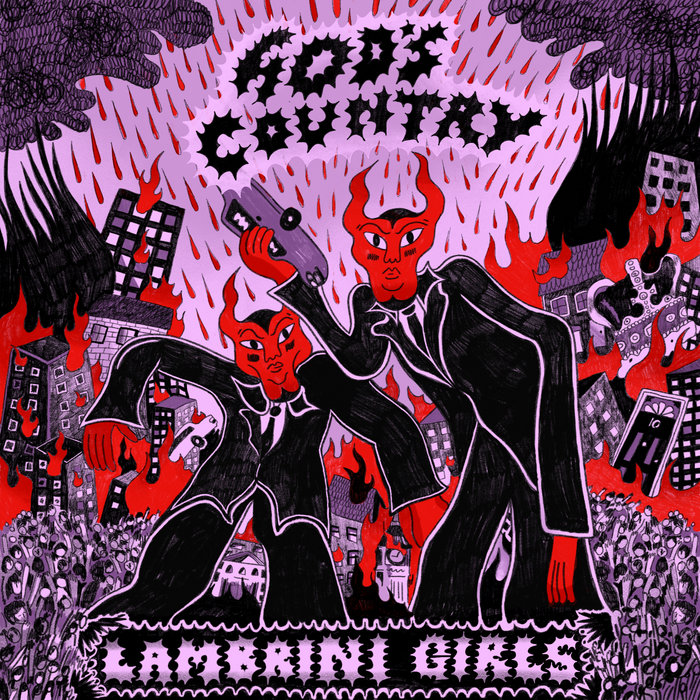
God’s Country – Lambrini Girls
this blog is GROOVY – check out great Soul, Funk, Jazz, Hip Hop, Bass, Breaks , Reggae, House n many more TUNES
Hey there, groove seekers! Let’s jump into the colorful and raucous world of Riot Grrrl, a punk rock movement that not only shook up the music scene but also served as a fierce declaration of female empowerment in the 1990s. Grab your combat boots and let’s dive into this radical history!
Riot Grrrl emerged in the early ’90s, primarily within the underground punk scenes of Washington State—think Seattle grunge vibes mixed with rebellious feminist zeal. It was all about showcasing women’s voices, fighting against sexism in music (and society!), and creating a space where girls could be loud, proud, and unapologetic.
Bikini Kill – Led by Kathleen Hanna, Bikini Kill were at the forefront of this movement. Their song “Rebel Girl” became an anthem for young feminists everywhere.
Bratmobile – Another major player! They brought catchy hooks and raw energy that embodied Riot Grrrl spirit.
L7 – Not just here for feminism; they rocked hard while taking on issues like misogyny with their killer riffs.
The Slits – An earlier influence merging punk with reggae sounds to champion women’s experiences before Riot Grrrl took off.
These ladies weren’t just musicians; they were activists who encouraged self-expression through zines (small magazines), art shows, concerts, and spoken word performances.
Speaking of zines—these DIY publications played a pivotal role in spreading ideas within the movement. Titles like Girl Germs and Jigsaw featured everything from personal stories to critique on societal norms. They acted as a voice for those often drowned out by mainstream media—a true grassroots effort!
Funny fact? Bands would sometimes use these zines to announce shows or message each other about crushes—like modern-day Tinder but way more chaotic & ink-smeared!
Now let’s get groovy with some amusing tidbits about our favorite Riot Grrrl bands:
Bikini Kill’s Early Days: Kathleen Hanna famously wrote “Smells Like Teen Spirit” graffiti on Kurt Cobain’s apartment wall which he later claimed inspired Nirvana’s mega-hit!
Bratmobile Rehearsals: It was said that Bratmobile rehearsed only occasionally due to being busy organizing events or distracted by shopping sprees at thrift stores.
L7’s Rockin’ Shenanigans: L7 once threw tampons into an audience while performing after realizing no one was paying attention—a cheeky reminder that girls are here too!
Riot Grrrl wasn’t just about shredding guitars; it was also about shouting out deep-seated frustrations regarding patriarchy— many songs tackled themes like body image, relationships, sexual violence, and self-love (or lack thereof).
More than rocking out loud tunes—the community encouraged discussions around serious topics with slogans such as “Girls To The Front!” highlighting marginalized voices in their spaces.
While it ignited revolutions for white women predominantly at first glance—it led to subcultures diversifying throughout its evolution! Women of color started forming collectives within riot grrrl framework contributing unique perspectives shining brightly even today.
Have you heard? Some labels printed early riot grrrl records using recycled materials — talk about being eco-conscious while blowing minds wide open!
As time wore on during late ‘90s/early 2000s pop-punk era threatened sweet rebellion—but resist we did! Even after falling off mainstream radar—we continued hustling independently influencing countless artists across genres including indie rock (hello Sleater-Kinney!) hip-hop divas like Lizzo reminiscing with notes filled positivity derived initially from this unapologetic drive towards equality back then…
They’ve left indelible influences showcased current gems yelling louder than ever imploring new generations rethink gender norms plus #MeToo movements echoing messages long shared… Ladies bringing integrity challenges vs whimsically catchy lyrics is what makes them timeless powerhouses together still rocking globally today!!
Fast forward years later: festivals honoring these trailblazers support active engagement promoting intersectionality now truly make waves pushing boundaries apply creatively coming alive again intertwining nostalgia fresh flavor inspiring rising stars every day across planet Earth celebrating individuality without restrictions…
And guess what? This revival isn’t fading away anytime soon—the spirits continue thriving showcasing fresh talent advocating passionately making sure loud chimes ring true always because when women unite?! Magic happens baby!!
So there you have it! From its humble beginnings in small towns bursting forth onto global stages —the vibrant soundscapes explore friendships love struggles risk-taking redefining connections continuing inspire hearts minds wherever tuned-in souls hangout!! Keep dancing fiercely forward friends embracing surprises life brings.. Rock On!!! 🎸✊🎤

God’s Country – Lambrini Girls